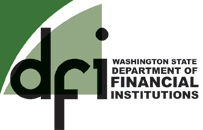From the Field - Common Examination Findings

The following are some of the common violations our exam teams in each industry found during examinations in the last quarter:
- MSB Programs
- Mortgage Originations – Mortgage Broker
- Mortgage Originations – Consumer Loan
- Mortgage Servicing
- Escrow Agent
MSB Programs
Annual Assessment Report – Every licensee must submit a completed annual report and annual assessment fee by no later than 5:00 PM July 1, or 5:00 PM the next business day if July 1 is not a business day as required under WAC 208-690-090. The annual assessment is based on the previous year’s Washington dollar volume of money transmission, payment instruments, currency exchanges, and prepaid access sale.
Permissible Investment and Transmission Liability Reporting and Coverage - Examiners cited continued failures to prepare monthly reports about permissible investments (PI). Licensees must prepare monthly reports about PI that include the calculation of average daily transmission liability (ADTL) as required under RCW 19.230.170(c) and WAC 208-690-085. Licensees must prepare and maintain monthly PI reports in order to demonstrate adequate PI as required under RCW 19.230.200 and RCW 19.230.210. The Department provides model PI and ADTL forms for licensees’ use on the agency’s website.
(Note: Washington licensees must prepare and maintain monthly PI reports in addition to quarterly PI reports required by the NMLS Money Services Business Call Reports.)
NMLS Reporting - Licensees must accurately and timely file Money Service Business Call Reports (MSBCRs) as required under RCW 19.230.152 and WAC 208-690-105. Accurate volume reporting is required, and should be reconcilable to exam documents and volumes reported in WA Annual Assessment Reports. For virtual currency licensees, virtual currency balances must be reported as outstanding transmission liability, and the value of virtual currency assets must be reported for permissible investments.
Disclosures – Disclosures required by WAC 208-690-205 must be provided as required. Fraud disclosures should be provided prior to each disclosure and include language similar to that included in WAC 208-690-205(2). Specific disclosures are required by virtual currency licensees under WAC 208-690-205(3), and must be disclosed separately from all other information required.
Mortgage Originations – Mortgage Broker
The most common violations during Q4 2020 are generally similar to previous quarters and include:
- Failure to file quarterly MCRs on time
- Failure to file accurate MCRs
- Failure to develop and implement an adequate Anti-Money Laundering program
- Advertising using the phrases “best” and “lowest” to describe rates, fees, or programs
- Advertising “No Closing Costs” or something for “Free”
- Failure to provide updated lock agreements when a change to the lock terms occurs
- Failure to include a link to the company’s NMLS consumer access web site on all internet advertisements. The requirement to include the link on all internet advertisements was new as of September 2019.
Additionally, the Department is seeing many brokers implementing non-compliant compensation agreements with loan originators. Some brokers aren’t aware that paying a percentage of the broker fees is prohibited by Regulation Z. Broker fees are a “term” of the loan per Regulation Z, and the Loan Originator Compensation Rule says loan originators may not be paid based on a term of the loan. Paying a percentage of the loan amount is specifically allowed. Paying a percentage of broker fees is specifically disallowed. Designated brokers should immediately revise their compensation agreements if they pay compensation based on fee income.
Mortgage Originations – Consumer Loans
Supervisory Plans – This continues to be one of the most common examination findings. WAC 208-620-301(6) requires that licensed managers prepare and maintain written supervisory plans for the employees they supervise. Plans must include the number of employees supervised, their physical locations, how the supervisor will adequately supervise employees not in the same location as the supervisor, and the type and volume of work performed by the supervised employees.
Rate Lock Agreements: WAC 208-620-510(5) requires licensees to provide a new rate lock agreement within three business days of a change to the locked interest rate. Changes to a locked interest rate can occur only if the borrower requests the change or for valid reasons such as changes in loan to value, credit scores, or other loan factors directly affecting pricing. Lock extensions and relocks are also valid reasons for changes to a previously locked interest rate. Examiners regularly identify borrowers who were not provided a new rate lock agreement within the required three business days of a change to the locked interest rate.
Using a DBA: Under WAC 208-620-420 licensees may apply to the Department to add a trade name or DBA to their main license name. Once approved by the Department, licensees must use the trade name in conjunction with their main license name or main license number. Landing pages of electronic advertisements must include both the licensee’s main license name and main license number as required by WAC 208-620-622(1). Examiners regularly identify disclosures and advertisements that identify the licensee by a trade name or DBA but do not include the main license name and/or the main license number as required by the Act.
Mortgage Loan Servicing
The most common violation continues to be filing inaccurate annual assessments, as mentioned in past newsletters. Most servicers don’t repeat this violation after a previous examination finding. As we continue to cycle through our examinations, this violation should eventually become less common.
As a reminder for this year’s filing: Report all Washington State residential servicing in your portfolio on January 1, 2020 (count and balance) plus any new Washington State servicing boarded during 2020 (count and beginning balance at boarding). Do not subtract loans paid off or transferred during the year. The loan is still reportable even if serviced for a single day during 2020. The only accounts fitting the criteria above that do not need to be included are loans sold servicing released that a licensee services on an “interim” basis while awaiting purchase/securitization.
The second most common violation for Q4 2020 is failing to suppress adverse credit reporting for borrowers who have availed themselves of the CARES Act’s forbearance provisions. Servicers should continue to implement procedures to ensure they are compliant with CARES Act provisions that apply to residential mortgage loans.
Escrow Agent
The most common finding on Escrow Agent examinations continues to be inaccurate names for settlement service providers on Closing Disclosures, most commonly identifying the escrow fee as being paid to a title company. Though the Closing Disclosure is the lender’s responsibility, the best practice for escrow agents is to notify the lender of any errors on their Closing Disclosures. The Department cites this as an internal routine and control item since the Agent does not prepare the Closing Disclosure.
Additionally, some Business Resumption Plans have gone stale, referencing software or providers the Agent no longer uses. A best practice is to review your Business Resumption Plan annually, and include the date of the latest review or revision.
